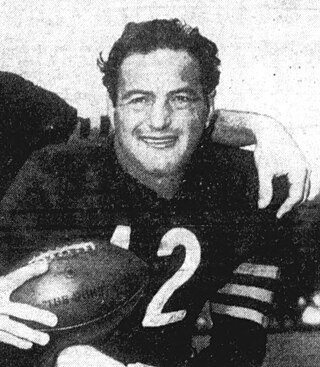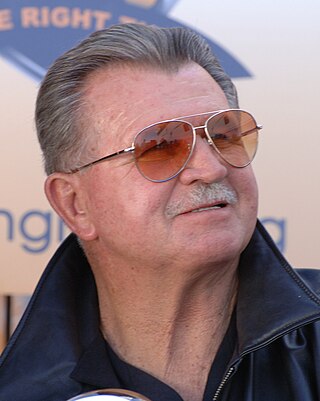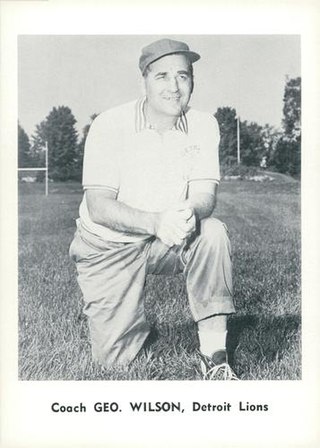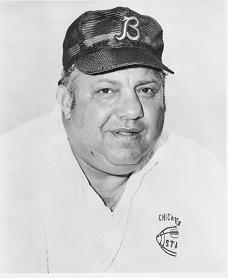
The Chicago Bears are a professional American football team based in Chicago. The Bears compete in the National Football League (NFL) as a member of the National Football Conference (NFC) North division. The Bears have won nine NFL Championships, eight prior to the AFL–NFL merger and one Super Bowl. They also hold the NFL records for the most enshrinees in the Pro Football Hall of Fame and the most retired jersey numbers. The Bears' NFL championships and overall victories are second behind the Green Bay Packers, with whom they have a long-standing rivalry.

James Edward Finks was an American professional football player, coach, and executive.

Sidney Luckman was an American professional football quarterback who played for the Chicago Bears of the National Football League (NFL) from 1939 through 1950. During his 12 seasons with the Bears, he led them to four NFL championships in 1940, 1941, 1943, and 1946.

Michael Keller Ditka is an American former professional football player, coach, and television commentator. During his playing career, he was UPI NFL Rookie of Year in 1961, a five-time Pro Bowl selection, and a six-time All-Pro tight end with the Chicago Bears, Philadelphia Eagles, and Dallas Cowboys in the National Football League (NFL); he was inducted into the College Football Hall of Fame in 1986 and the Pro Football Hall of Fame in 1988. Ditka was the first tight end in NFL history to reach 1,000 yards receiving.

George Stanley Halas Sr., nicknamed "Papa Bear" and "Mr. Everything", was an American professional football end, coach, and executive. He was the founder and owner of the Chicago Bears of the National Football League (NFL), and served as his own head coach on four occasions. He was also lesser-known as a player for the New York Yankees of Major League Baseball (MLB). He is the namesake for the NFC Championship trophy.

Gale Eugene Sayers was an American professional football halfback and return specialist in the National Football League (NFL). In a relatively brief but highly productive NFL career, Sayers spent seven seasons with the Chicago Bears from 1965 to 1971, though multiple injuries effectively limited him to five seasons of play. He was known for his elusiveness and agility and was regarded by his peers as one of the most difficult players to tackle.
The 1968 NFL season was the 49th regular season of the National Football League. Per the agreement made during the 1967 realignment, the New Orleans Saints and the New York Giants switched divisions; the Saints joined the Century Division while the Giants became part of the Capitol Division.

Eugene A. Ronzani was a professional football player and coach in the National Football League (NFL). He was the second head coach of the Green Bay Packers, from 1950 to 1953, and resigned with two games remaining in the 1953 season.

Richard Jose Casares was an American professional football player who was a fullback in the National Football League (NFL) and American Football League (AFL) for twelve seasons during the 1950s and 1960s. Casares played college football for the University of Florida, where he was standout fullback and kicker. Casares played professionally for the Chicago Bears and Washington Redskins of the NFL, and was a member of the expansion Miami Dolphins of the AFL.
The Chicago Bears American football franchise is a charter member of the National Football League (NFL), and has played in all of the league's 100 seasons. The team has captured nine NFL championships – eight NFL championships and one Super Bowl – second most all time behind the Green Bay Packers. The franchise has also recorded more victories than any other franchise (739), retired the most uniform numbers (14), and have the most members in the Pro Football Hall of Fame (29). The Bears have played in over a thousand games since becoming a charter member of the NFL in 1920.

George William Wilson Sr. was a professional football end for the Chicago Bears and later a coach for the National Football League (NFL)'s Detroit Lions and the American Football League (AFL)'s Miami Dolphins. Wilson attended and played football at Northwestern University. He went undrafted in 1937, before being signed by the Chicago Bears. Wilson played for ten seasons with the Bears, compiling overall record of 111 pass receptions, 1,342 receiving yards, and fifteen touchdowns. He was a member of the Bears during their five appearances in the National Football League Championship Game from 1940 to 1943 and 1946. Additionally, he was selected for the NFL All-Star Game from 1940 to 1942. He also played one season of professional basketball for the Chicago Bruins in 1939–40. Wilson won seven championships combined as a player and coach.

Abraham Gibron was an American professional football player and coach. Gibron played 11 seasons as a guard in the All-America Football Conference (AAFC) and National Football League (NFL) in the 1940s and 1950s, mostly with the Cleveland Browns. He was then hired as an assistant coach for the NFL's Washington Redskins and Chicago Bears before becoming head coach of the Bears between 1972 and 1974.

William James Wade Jr., often referred to during his playing career as Billy Wade, was an American football quarterback who played in the National Football League (NFL) for the Los Angeles Rams (1954-1960) and Chicago Bears (1961-1966).

Kenneth William Kavanaugh was an American football player, coach, and scout. He played professionally in the National Football League (NFL) for the Chicago Bears as an end from 1940 to 1950, except for three seasons during which he served in World War II. He led the league in receiving touchdowns twice, and is a member of the NFL 1940s All-Decade Team. He is the Bears' all-time leader in receiving touchdowns, with 50. He retired with the second most receiving touchdowns in NFL history and was the second to reach 50 touchdowns in NFL history.
Joseph Francis Fortunato Jr. was an American professional football player who spent his entire 12-year National Football League (NFL) career playing linebacker for the Chicago Bears. A five-time Pro Bowl selection, he was the captain and signal-caller for the Bears defense, leading to an NFL Championship in 1963. Fortunato is one of only four players, and the only defensive player named to the National Football League 1950s All-Decade Team who has not yet been enshrined in the Pro Football Hall of Fame.
The 1963 Chicago Bears season was their 44th regular season and 12th post-season appearance in the National Football League. The team finished with an 11–1–2 record to gain their first Western Conference championship since 1956, and the berth to host the NFL Championship Game against the New York Giants (11–3–0).
The 1943 season was the Chicago Bears' 24th in the National Football League. The team failed to match on their 11–0 record from 1942 and finished at 8–1–1, under temporary co-coaches Hunk Anderson and Luke Johnsos. On the way to winning the Western Division, the Bears were, yet again, denied a chance at an undefeated season by the defending champion Redskins in Washington. The Bears had their revenge in the NFL title game and defeated the Redskins at Wrigley Field to claim their sixth league title. It was their third championship in four years, establishing themselves as the pro football dynasty of the early 1940s.
The 1968 season was the Chicago Bears' 49th in the National Football League. The team failed to improve on their 7–6–1 record from 1967 and finished with a 7–7 record under first-year head coach Jim Dooley and earning them a second-place finish in the Central Division within the NFL's Western Conference, a game behind the Minnesota Vikings.
The 1940 NFL Championship Game, sometimes referred to simply as 73–0, was the eighth title game of the National Football League (NFL). It was played at Griffith Stadium in Washington, D.C., on December 8, with a sellout capacity attendance of 36,034.













